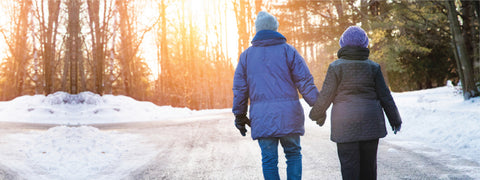Be Prepared for the Cold Spell
We need to take extra care during the winter months. Icy conditions, shorter daylight hours, and the cold weather, can significantly increase the risk of falls and injuries.
Falls are one of the leading causes of hospital visits in winter, particularly among older adults.
Taking the steps to reduce the risk of a fall, and maintaining good health is particularly important, for older adults, those who have mobility challenges, and for those who are medically vulnerable.
Here are a few tips to help you stay safe and mobile, during the tough winter month
Keeping Safe Outdoors
- Frostbite and hypothermia are more serious conditions that require intentional planning to prevent. Avoid going outdoors, if unnecessary or seek help from others.
- Visibility is reduced in snowy condition so wear high visibility clothing or carry a torch.
- Wear layers, the layer closest to your skin should be moisture-wicking, followed by an insulating layer of wool or fleece. Your outermost layer should be water-proof.
- Protect your outer extremities, hats, gloves, mittens and large shoes with thick socks can help keep your head, ears, hands and feet warm.
- Wear shoes or boots with good traction.
- Do not hurry while walking outside. Tap your foot over an area, to test if it’s icy before stepping onto it. This is especially important when using steps or getting out of your car. Pay attention to your steps and walk slowly. Small steps, almost from side to side, help you maintain your center of gravity.
- Always use handrails, a walking stick, your walker or cane when out in winter weather.
Driving Safely
Avoid unnecessary travel. If you MUST travel, prepare for severe conditions by
- Keeping your vehicle fuel tank close to full, during the winter.
- Ensure all your windows are clean and free from snow and bring a scraper and de-icer with you. Snow left on the roof will become loose and can drop onto the windscreen during braking, thereby causing sudden and severe restriction to your vision.
- Take and Make sure your mobile phone is fully charged.
- If your car has rear wheel drive, the addition of extra weight in the boot, such as a bag of sand or cement, will help your wheels to grip.
- Prepare your vehicle before setting off. Check the brakes, lights, wipers, tyre tread and de-mist functions.
- Check your tyre treads and pressure, including the spare tyre. The minimum legal limit is 1.6mm for a car (1mm for motorcycles), but a minimum tread of 3mm is advised.
- It is advised that motorists carry a number of essentials in the boot of their car to use in case of an emergency.; have a high visibility vest, spare fuel, appropriate footwear in case you need to leave your vehicle e.g. boots, a hazard warning triangle, a spare wheel, tow rope, shovel, de-icing equipment (for glass and door locks), spare bulbs, first aid kit, fire extinguisher, a working torch, a car blanket, additional clothing and some food and water.

Winter Weather Tips for Wheelchair Users & Powered Mobility Users
We all know that there are times, when regardless of weather, you will still need to get out in your wheelchair .Here are some things you can do to help stack the odds in your favour, when using your wheelchair in colder weather conditions:
- If the pathways are still covered with a deep blanket of snow, then stay home.
- Keep a set of knobby winter tires on your wheelchair, during the winter. If you use a manual wheelchair then keep an extra set of quick mount wheels with snow tires mounted on them handy. Pop them on as needed and get a bit of a rolling edge.
- If you are a powerchair or scooter user, remember that cold weather is harder on batteries and your normal cruising range (on a full charge) may be greatly diminished. Batteries will also drain quicker with the increased load of pushing you and your wheelchair through even light snow. Make sure that your batteries are fully charged before going
- If your wheelchair controller (joystick) is not waterproof (and many are not), cover it with a joystick cover or a plastic bag.
- Take extra precautions with any part of your body that has diminished or lost sensation. You may not feel the effects of cold or may feel it too late, so pay close attention and inspect these areas, when outdoors in harsher weather conditions.
- Darkness sets in early during winter months, snow may still be falling, there may be no sidewalks or they may not have been cleared of snow. You and your wheelchair are going to be hard to spot. Try this to improve your visibility. Wear a Hi-Viz jacket, take a torch with you if you have no lighting. Tie a tall wheelchair safety flag to your wheelchair frame to increase your chances of being spotted. Remember that most wheelchairs place you low to the ground. It may not be easy to spot you!
- Fully charge your smart phone and take it with you. Wheelchairs can tip, roll, and skid into places that you can’t get out of. Being able to call for help is a priceless option.
- Check that all wheelchair components are working right and are secure. A malfunctioning wheelchair can easily become a non-functioning wheelchair in cold weather.
- If you can, buddy up. Try to find a pal or family member who needs to travel down the same path as you and go it together. There is safety in numbers.
- Use a helmet! Cruising in a wet, slippery, lowered visibility world is many times more dangerous.
Family, Carers, Friends and Neighbours can greatly help
- Keep in contact by phone or text. Ensure the person can access to their mobile phone and it is fully charged.
- Help to shovel, grit or sand or de-ice a driveway, footpath, and to keep steps clear of snow.
- Clear snow or ice early in the day if possible.
- Never use boiling water to clear snow, as it may re-freeze and cause the formation of black ice.
- Offer to collect essential fuel supplies, shopping or to collect medications.
- If you have to use medical equipment or a powered mobility device every day please make sure that they always have access to a power supply.
- If you have any doubts about the safety of someone you know who has a disability seek the assistance of An Garda Síochánaor local health and social services .
Useful References and Resources
www.gov.ie – Be Winter Ready
gov.ie - Health Advice from the HSE - Be Winter Ready
hse.ie Avoid Slips, trips and falls during the cold snap https://about.hse.ie/news/avoid-slips-trips-and-falls-during-the-cold-snap/
www. Met.ie – National and Regional Weather forecasts
www.theaa.com Road traffic news




